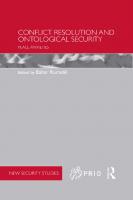Mediating Across Difference: Oceanic and Asian Approaches to Conflict Resolution 9780824860967
Mediating Across Difference is based on a fundamental premise: to deal adequately with conflict—and particularly with co
159 56 1MB
English Pages 264 [296] Year 2011
Table of contents :
Contents
Acknowledgments
Introduction
I. The Values and Limits of Western Approaches to Conflict Resolution
Chapter 1. Postcolonial Conflict Resolution
Chapter 2. Silence in Western Models of Conflict Resolution
Chapter 3. Local Conflict Resolution in the Shadows of Liberal International Peacebuilding
II. Australian Aboriginal and Māori Approaches to Conflict Resolution
Chapter 4. Conflict Murri Way: Managing through Place and Relatedness
Chapter 5. Conflict Resolution and Decolonisation: Aboriginal Australian Case Studies in ‘Enlarged Thinking’
Chapter 6. Māori Dispute Resolution: Traditional Conceptual Regulators and Contemporary Processes
III. Melanesian Approaches to Conflict Resolution
Chapter 7. Christianity, Custom, and Law: Conflict and Peacemaking in the Postconflict Solomon Islands
Chapter 8. Bougainville: A Source of Inspiration for Conflict Resolution
IV. East Asian Approaches to Conflict Resolution
Chapter 9. Crossing Borders: Indonesian Experience with Local Conflict Resolution
Chapter 10. Mediating Difference in Uchi Space: Conflict Management Lessons from Japan
Chapter 11. Shu and the Chinese Quest for Harmony: A Confucian Approach to Mediating across Difference
Chapter 12. Korean Sources of Conflict Resolution: An Inquiry into the Concept of Han
Chapter 13. Conclusion: Mediating the Mediation with Difference
Contributors
Index
Contents
Acknowledgments
Introduction
I. The Values and Limits of Western Approaches to Conflict Resolution
Chapter 1. Postcolonial Conflict Resolution
Chapter 2. Silence in Western Models of Conflict Resolution
Chapter 3. Local Conflict Resolution in the Shadows of Liberal International Peacebuilding
II. Australian Aboriginal and Māori Approaches to Conflict Resolution
Chapter 4. Conflict Murri Way: Managing through Place and Relatedness
Chapter 5. Conflict Resolution and Decolonisation: Aboriginal Australian Case Studies in ‘Enlarged Thinking’
Chapter 6. Māori Dispute Resolution: Traditional Conceptual Regulators and Contemporary Processes
III. Melanesian Approaches to Conflict Resolution
Chapter 7. Christianity, Custom, and Law: Conflict and Peacemaking in the Postconflict Solomon Islands
Chapter 8. Bougainville: A Source of Inspiration for Conflict Resolution
IV. East Asian Approaches to Conflict Resolution
Chapter 9. Crossing Borders: Indonesian Experience with Local Conflict Resolution
Chapter 10. Mediating Difference in Uchi Space: Conflict Management Lessons from Japan
Chapter 11. Shu and the Chinese Quest for Harmony: A Confucian Approach to Mediating across Difference
Chapter 12. Korean Sources of Conflict Resolution: An Inquiry into the Concept of Han
Chapter 13. Conclusion: Mediating the Mediation with Difference
Contributors
Index

- Author / Uploaded
- Morgan J. Brigg (editor)
- Roland Bleiker (editor)




![Peace and Conflict Resolution in Islam, Islamic Perspectives on War, Peace and Conflict Resolution [1 ed.]
9781842001608](https://ebin.pub/img/200x200/peace-and-conflict-resolution-in-islam-islamic-perspectives-on-war-peace-and-conflict-resolution-1nbsped-9781842001608.jpg)




